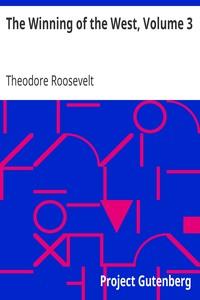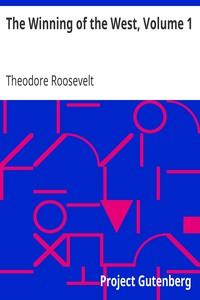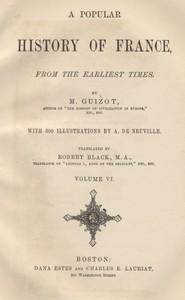|
|
Read this ebook for free! No credit card needed, absolutely nothing to pay.Words: 92718 in 17 pages
This is an ebook sharing website. You can read the uploaded ebooks for free here. No credit cards needed, nothing to pay. If you want to own a digital copy of the ebook, or want to read offline with your favorite ebook-reader, then you can choose to buy and download the ebook.

: The Winning of the West Volume 3 The Founding of the Trans-Alleghany Commonwealths 1784-1790 by Roosevelt Theodore - Northwest Old History; West (U.S.) History; United States Territorial expansion@FreeBooksTue 06 Jun, 2023 CHAPTER THE WINNING OF THE WEST. THE INRUSH OF SETTLERS, 1784-1787. At the beginning of 1784 peace was a definite fact, and the United States had become one among the nations of the earth; a nation young and lusty in her youth, but as yet loosely knit, and formidable in promise rather than in actual capacity for performance. The Western Frontier. On the western frontier lay vast and fertile vacant spaces; for the Americans had barely passed the threshold of the continent predestined to be the inheritance of their children and children's children. For generations the great feature in the nation's history, next only to the preservation of its national life, was to be its westward growth; and its distinguishing work was to be the settlement of the immense wilderness which stretched across to the Pacific. But before the land could be settled it had to be won. The valley of the Ohio already belonged to the Americans by right of conquest and of armed possession; it was held by rifle-bearing backwoods farmers, hard and tenacious men, who never lightly yielded what once they had grasped. North and south of the valley lay warlike and powerful Indian confederacies, now at last thoroughly alarmed and angered by the white advance; while behind these warrior tribes, urging them to hostility, and furnishing them the weapons and means wherewith to fight, stood the representatives of two great European nations, both bitterly hostile to the new America, and both anxious to help in every way the red savages who strove to stem the tide of settlement. The close alliance between the soldiers and diplomatic agents of polished old-world powers and the wild and squalid warriors of the wilderness was an alliance against which the American settlers had always to make head in the course of their long march westward. The kings and the peoples of the old world ever showed themselves the inveterate enemies of their blood-kin in the new; they always strove to delay the time when their own race should rise to wellnigh universal supremacy. In mere blind selfishness, or in a spirit of jealousy still blinder, the Europeans refused to regard their kinsmen who had crossed the ocean to found new realms in new continents as entitled to what they had won by their own toil and hardihood. They persisted in treating the bold adventurers who went abroad as having done so simply for the benefit of the men who stayed at home; and they shaped their transatlantic policy in accordance with this idea. The Briton and the Spaniard opposed the American settler precisely as the Frenchman had done before them, in the interest of their own merchants and fur-traders. They endeavored in vain to bar him from the solitudes through which only the Indians roved. All the ports around the Great Lakes were held by the British; their officers, military and civil, still kept possession, administering the government of the scattered French hamlets, and preserving their old-time relations with the Indian tribes, whom they continued to treat as allies or feudatories. To the south and west the Spaniards played the same part. They scornfully refused to heed the boundary established to the southward by the treaty between England and the United States, alleging that the former had ceded what it did not possess. They claimed the land as theirs by right of conquest. The territory which they controlled stretched from Florida along a vaguely defined boundary to the Mississippi, up the east bank of the latter at least to the Chickasaw Bluffs, and thence up the west bank; while the Creeks and Choctaws were under their influence. The Spaniards dreaded and hated the Americans even more than did the British, and they were right; for three fourths of the present territory of the United States then lay within the limits of the Spanish possessions. Thus there were foes, both white and red, to be overcome, either by force of arms or by diplomacy, before the northernmost and the southernmost portions of the wilderness lying on our western border could be thrown open to settlement. The lands lying between had already been conquered, and yet were so sparsely settled as to seem almost vacant. While they offered every advantage of soil and climate to the farmer and cultivator, they also held out peculiar attractions to ambitious men of hardy and adventurous temper. The Rush of Settlers With the ending of the Revolutionary War the rush of settlers to these western lauds assumed striking proportions. The peace relieved the pressure which had hitherto restrained this movement, on the one hand, while on the other it tended to divert into the new channel of pioneer work those bold spirits whose spare energies had thus far found an outlet on stricken fields. To push the frontier westward in the teeth of the forces of the wilderness was fighting work, such as suited well enough many a stout soldier who had worn the blue and buff of the Continental line, or who, with his fellow rough-riders, had followed in the train of some grim partisan leader. The people of the New England States and of New York, for the most part, spread northward and westward within their own boundaries; and Georgia likewise had room for all her growth within her borders; but in the States between there was a stir of eager unrest over the tales told of the beautiful and fertile lands lying along the Ohio, the Cumberland, and the Tennessee. The days of the early pioneers, of the men who did the hardest and roughest work, were over; farms were being laid out and towns were growing up among the felled forests from which the game and the Indians had alike been driven. There was still plenty of room for the rude cabin and stump-dotted clearing of the ordinary frontier settler, the wood-chopper and game hunter. Folk of the common backwoods type were as yet more numerous than any others among the settlers. In addition there were planters from among the gentry of the sea-coast; there were men of means who had bought great tracts of wild land; there were traders with more energy than capital; there were young lawyers; there were gentlemen with a taste for an unfettered life of great opportunity; in short there were adventurers of every kind. Free books android app tbrJar TBR JAR Read Free books online gutenberg More posts by @FreeBooks
: The Winning of the West Volume 2 From the Alleghanies to the Mississippi 1777-1783 by Roosevelt Theodore - Northwest Old History; West (U.S.) History; United States Territorial expansion@FreeBooksTue 06 Jun, 2023

: The Winning of the West Volume 1 From the Alleghanies to the Mississippi 1769-1776 by Roosevelt Theodore - Northwest Old History; West (U.S.) History; United States Territorial expansion@FreeBooksTue 06 Jun, 2023
|
Terms of Use Stock Market News! © gutenberg.org.in2025 All Rights reserved.






